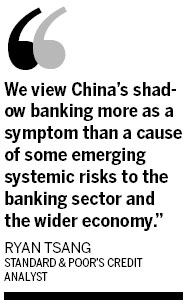Shadow banking troubles 'years away'
|
A bank employee introduces products to customers in Wenzhou, Zhejiang province. Standard & Poor's estimated that shadow banking took up 22.9 trillion yuan of credit in China by 2012. [Photo/Xinhua] |
China well-equipped to absorb possible hit, says Standard & Poor's
A systemic threat to China posed by rapid expansion of shadow-banking activities may be several years away, if it emerges at all, according to a report from Standard & Poor's Ratings Services on Thursday.
"We believe major Chinese banks' capitalization, earnings, and liquidity profiles provide a comfortable buffer to absorb any possible hit from shadow banking and credit risks in the wider Chinese economy," said S&P's credit analyst Ryan Tsang.
Several high-profile defaults of wealth management products have highlighted the risks to China's financial system and economy posed by the rapid growth of shadow banking in recent years, the international ratings agency said.
The shadow banking activities refer to credit intermediation involving entities and activities outside the regular banking system.
The agency's remarks came after the China Banking Regulatory Commission on Wednesday capped the amount of wealth management products invested in "non-standard" assets - assets not traded on markets - to 35 percent of total wealth management products issued by banks and 4 percent of banks' total assets.
Banks were also instructed to improve documentation and transparency about wealth management products and underlying assets and projects.
"We view China's shadow banking more as a symptom than a cause of some emerging systemic risks to the banking sector and the wider economy," said Tsang.
Leverage of China's economy has risen strongly in the past five years, and the majority of new lending in recent years has taken place outside the core banking system.

S&P estimated that shadow banking accounted for 22.9 trillion yuan ($3.7 trillion) of credit in China as of the end of 2012. That is equivalent to 34 percent of the total loans in the banking sector and comprises 44 percent of China's GDP in 2012.
Orderly growth in China's shadow-banking market, particularly in the form of a deepening and functioning debt capital market, could benefit the banking sector if it leads to efficient capital allocation and diminishes the government's dominant role in financing, said Tsang.
Louis Kuijs, chief China economist at the Royal Bank of Scotland Group, said transparency in shadow banking is often poor.
"Shadow banking has expanded too rapidly since early 2012 and there is a need to strengthen regulation and to rein in risks and the pace of expansion," said Kuijs. "We expect policymakers will take further steps."
But a systemic financial crisis - one that overwhelms the economy and the financial system - is less likely in China, although overall lending as a percentage of GDP is rather high for a country of China's level of development, Kuijs said.
"China's banking system is less leveraged and better and easier funded than the systems in the crisis countries, making it in better shape to absorb shocks such as asset price fluctuations."
He said if the government reins in shadow banking but core lending continues to expand, the impact on growth should be contained, especially if such a policy adjustment is flanked by a more active use of pure fiscal policy.
Yao Wei, China economist at Societe Generale CIB, said the moves made by the regulatory commission are the harshest and most concrete tightening measures to date regarding wealth management products, aimed at capping future risk.
"However, the immediate impact should be manageable for banks, as the banking regulator has been communicating with the major banks about rule changes for some time."
Hu Bin, a Moody's vice-president and senior analyst, said tighter controls over wealth management products will not have a substantial effect on banks' profitability, as income generated from selling such products contributes only a small proportion of the total.
"It would rather affect banks' capability to collect deposits and manage their liquidity, as part of the funds from selling these products would go to the banks' deposit base one way or another."
Medium-sized and smaller banks would suffer more, as they have been using wealth management products more actively for funding and revenue diversification, he said.
























